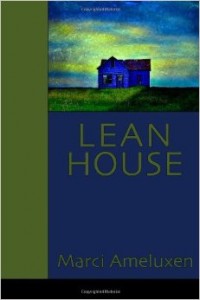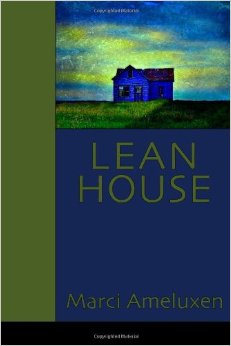Lean House by Marci Ameluxen
-Reviewed by James O’Leary-

Lean House is an unveiled account of the impossible loneliness of trying to take care of a mother with schizophrenia. In confronting this deeply personal subject, Ameluxen is most effective when writing in the third person, as in “Fairy Tale” and “Last Visit With My Mother.” There is a richness in the writing when we enter the impartial, the abstract:
She held a spoon of clear broth
no
she held an arrow
no
she held an empty spoon
yes.
When given contrasting imagery and left to draw our own conclusions, the writing is lively and surprising. There is, however, a loss of spark when the poems come back to a focused, fixed reality.
This is a chapbook centred around a daughter’s relationship with her mother, from childhood to adulthood. The mother is often described as something we can only see from the outside and wonder about: she is ‘a broken shell’, ‘a crushed flower’, ‘a gray leaf.’ The barrier around this central figure means there sometimes isn’t a lot to hook onto. This of course speaks to how shut down a person can be when in the depths of an illness, but the lens through which we encounter her often doesn’t go quite quite deep enough either. The details shared about ambulance trips and hospital visits are somewhat flat – after reading a poem I have been told about an experience, but have little more of an understanding of how it felt. “On Filing an Antiharrassment Order Against Her” starts:
I stand at the government counter
to pay my eighty dollars,
complete the formsthat may stop her disturbed
visits to my workplace,
cease the midnight phone calls
This type of objective description could be a great starting place for deeper revelation, but the poem stops short of exploring the moment and what it means.
We are rarely invited fully into the world of the speaker, and this is the main weakness of the book. Though the subject matter is compelling and emotional, there is something lacking in the expression. There is a sense that these are personal memories that haven’t translated to the page with complete clarity.
Images of winter appear throughout and places are continuously described as cold and dark, these adjectives losing their power through repetition. The poems are trying to connect dots, but many times it feels like they don’t quite fill in enough of a picture. At the same time, Lean House has moments where the language shines. “Rain, Northwest Meaning” is a poem that displays a great level of observation and craft:
I knew the fisher girl who dropped a line into water,
her hook for bullheads, perch and the cat-eyeddogfish, gray bellies slit pink by fisherman, their guts
ebbing.
Though uneven, there is enough that works in Ameluxen’s chapbook to make it worth keeping an eye on her future work.





